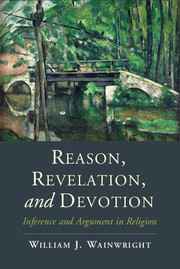Book contents
- Frontmatter
- Dedication
- Contents
- Acknowledgments
- Introduction
- 1 Four Examples of Religious Reasoning
- 2 The Purposes of Argument and the Person-Relativity of Proofs
- 3 Religious Reading and Theological Argument
- 4 Passional Reasoning
- 5 The Role of Rhetoric in Religious Argumentation
- 6 Reason, Revelation, and Religious Argumentation
- 7 Theology and Mystery
- Conclusion
- Notes
- Index
2 - The Purposes of Argument and the Person-Relativity of Proofs
Published online by Cambridge University Press: 05 December 2015
- Frontmatter
- Dedication
- Contents
- Acknowledgments
- Introduction
- 1 Four Examples of Religious Reasoning
- 2 The Purposes of Argument and the Person-Relativity of Proofs
- 3 Religious Reading and Theological Argument
- 4 Passional Reasoning
- 5 The Role of Rhetoric in Religious Argumentation
- 6 Reason, Revelation, and Religious Argumentation
- 7 Theology and Mystery
- Conclusion
- Notes
- Index
Summary
Until quite recently, philosophical studies of religious argumentation have almost exclusively focused on the validity of the arguments and the truth of their premises. This is not altogether surprising since no invalid argument or argument with a false premise is a good argument. But while truth and validity are necessary conditions of good arguments, they aren't sufficient since an argument can meet both conditions and not be probative.
Arguments are constructed for various purposes, and these purposes must be taken into account when evaluating their success or failure. Moreover, reasoning is always situated – it does not occur in a vacuum. Arguments are the products of men and women with various needs, hopes, fears, sensitivities, and proclivities, and with diverse individual histories, who are responding to highly specific problems and difficulties. They are not the expressions of a view from nowhere that abstracts from the existential specificity of the reasoner and/or the particularities of his or her concrete situation. Yet the latter frequently determines whether an argument is or is not probative in a particular situation or for a particular person.
In order for arguments such as those discussed in Chapter 1 to be good ones, it is not enough that they be valid and noncircular and have true premises. For as George Mavrodes pointed out, proofs are “person-relative” – a valid, noncircular argument with true premises can prove something to Mary without proving it to John. To take a trivial example, if Mary knows that all the premises of a valid, noncircular argument are true and John does not, the argument can extend Mary's knowledge without extending John's. The proof's person-relativity in this case depends on the fact that Mary knows something that John does not. Other sources of person-relativity are less obvious, however.
The Purposes of Religious Arguments
Arguments are constructed for various purposes, for example, and these have a bearing on their success. Consider Udayana's, Madhva's, and Ramanuja's contrasting attitudes toward proofs for the existence of God. All three were theists. Udayana was an adherent of the Nyaya-Vaisesika school, which identified God with Shiva. Madhva and Ramanuja were Vedantists who identified God with Vishnu. All three accepted the authority of the Vedas.
- Type
- Chapter
- Information
- Reason, Revelation, and DevotionInference and Argument in Religion, pp. 32 - 47Publisher: Cambridge University PressPrint publication year: 2015

